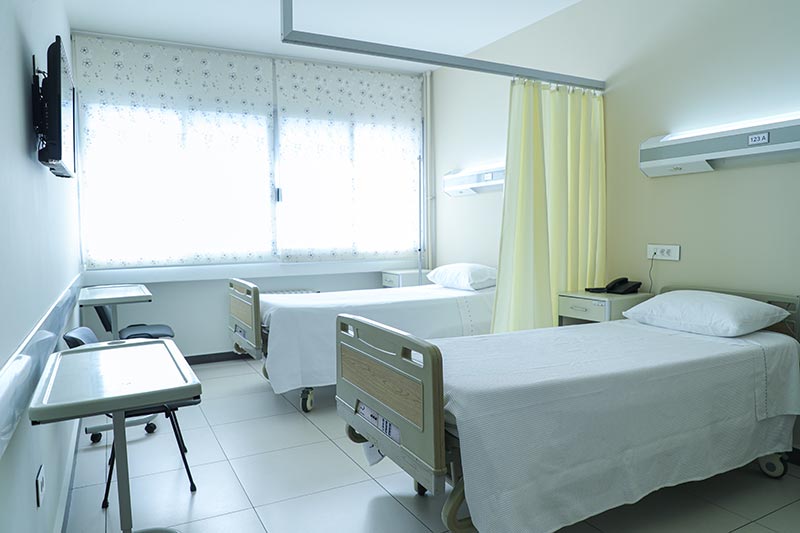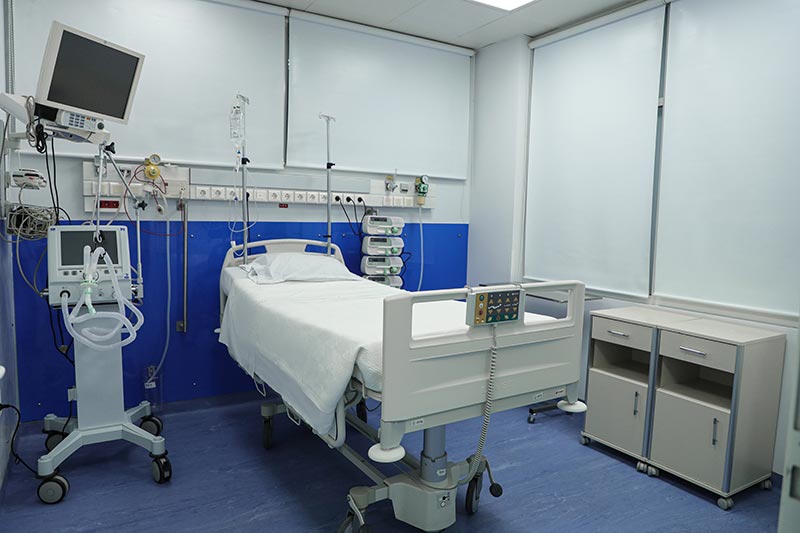Meals
Meals are served 3 times per day: at 7.30 AM, 12.30 noon and 6.30 PM. Patients undergoing special dietary regimen receive periodic visits from a nutritionist offering appropriate options for their health condition.
Cafeteria
The cafeteria provides daily dishes as well as a selection of food and drinks (Extension 1766).
Supplementary Bed
For cases which require one of the patient’s relatives to stay over at night: kindly refer to the nurse in charge to secure an extra bed, the cost of which will be added to the hospital bill. As for the first-class rooms: they are equipped with a chair that can be used for sleeping when needed.
Parking
In the outer courtyards of the hospital, you will find people in charge, working to facilitate and organize parking for cars.
Security service
A specialized security company is in charge with securing internal and external protection for patients and visitors, as well as for all hospital staff
The Chapel
For those wishing to pray, a chapel is located on the first floor, towards the main entrance of the hospital.
In all hospital departments
• Monday through Saturday: 9.30 AM to 1.00 PM – 3.00 PM to 8.00 PM
• Sundays and holidays: 9.30 AM to 8.00 PM
In the intensive care unit
12 to 12.30 noon – 4.30 PM to 5.00 PM
Your opinion matters to us, and your comfort is essential. Therefore, dedicated boxes are available and a hospital employee will be reachable to collect your suggestions and complaints, so that they can be acted upon and dealt with. The hospital administration and its employees of all categories are always at your service, each in his/her field of work and specialization. Your well-being is our priority.
Saint George Medical Center is committed to providing high-quality healthcare to its patients without any discrimination based on religion, gender, race, color, origins or disability. The hospital management will respect and protect the rights of patients.
Patient rights
1- Identifying the attending physician and nurses.
2- Being informed about his/her medical condition, diagnosis, prognosis, treatment plan and outcomes (anticipated or no) in terms he/she can understand to make necessary decisions.
3- Obtaining the personal consent of the patient or his/her representative before any treatment initiative.
4- Refusing or discontinuing any procedure, drug or treatment unless it goes against the Lebanese Law and be informed about the consequences of his/her refusal.
5- Appointing a surrogate decision-maker to take healthcare decisions, and determining what information would be provided to their family and under what circumstances.
6- Maintaining confidentiality of medical and personal information.
7- Receiving care in a safe environment free of all forms of abuse and harm.
8- Receiving care that is respectful to his/her personal beliefs and values.
9- Expecting a reasonable continuity of care and receiving written instructions upon his/her discharge.
Patient duties
1- Complying with the instructions and directives of the hospital.
2- Providing complete and accurate information related to his/her health condition, previous hospitalization, medication, allergies and other health matters.
3- Showing decent and responsible behavior that considers the rights of other patients.
4- Refraining from smoking and observing the safety regulations.
5- Respecting doctors and health workers and not assaulting them in any way, verbally or physically.
6- Informing the nurse about any medication, food or electrical/medical device brought to the hospital.
7- Handing valuables and personal belonging to a trusted person or securing them through the “Patient’s Valuable Record” until he/she leaves the hospital.
8- Providing the necessary third-party payers information for bill processing and fulfilling the financial obligations as promptly as possible.



